Months of Meryl: August Osage County (2013)
 Thursday, November 8, 2018 at 1:20PM
Thursday, November 8, 2018 at 1:20PM John and Matthew are watching every single live-action film starring Meryl Streep.
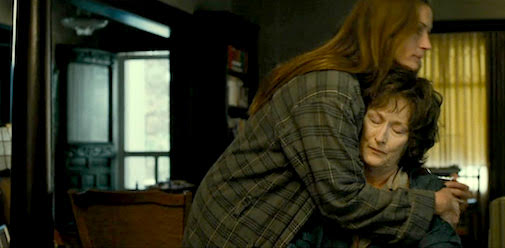
#45 —Violet Weston, the cancer-stricken, drug-addicted matriarch of an Oklahoma family.
MATTHEW: Tracy Letts’ high-octane, Pulitzer Prize-winning family drama August: Osage County was the toast of the 2007-2008 Broadway season, which made a cinematic adaptation all but inevitable and the star involvement of Meryl Streep an equally foregone conclusion. The vituperative, pill-popping Violet Weston is the crowning achievement of Letts’ play and arguably the meatiest dramatic role to come along for sexagenarian actresses in the past 15 years. The part has been previously interpreted on stage by the Tony-winning Deanna Dunagan (who originated the character in the initial Steppenwolf production), Estelle Parsons, and Phylicia Rashad, any one of whom could have bowled us over in an alternate film, as might have rumored candidates like Jessica Lange, Sissy Spacek, and Glenn Close. This isn’t to take away a single merit from Streep’s no-holds-barred work, but rather acknowledge that Streep herself is the rare and defiant exception who proves the rule that actresses over the age of 50 are anathema to Hollywood’s gatekeepers.
Before falling in love with the eye of the camera, Streep was first and foremost a creature of the theater...
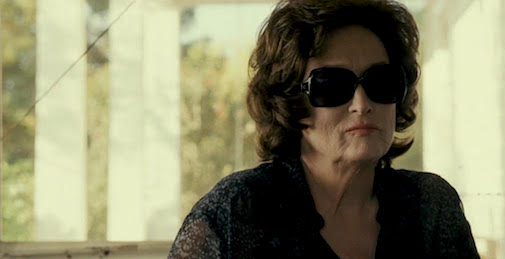
This makes her ongoing participation in stage-to-screen projects like Plenty, Dancing at Lughnasa, Angels in America, Doubt, and August: Osage County seem like fruitful attempts to fuse her two passions within the medium that made her a legend. These films haven’t always showcased Streep to her finest ability, a result of some dire collaborators, but also what comes across as Streep’s own hesitancy about how to best reconcile her natural instinct for the theatrical with the stripping-away of artifice that screen work usually demands. (To my mind, Streep’s tour de force in 1987’s Ironweed is her most inspired melding of these two performative strains.)
Streep received some memorable flack from critics like Stephanie Zacharek and David Edelstein, who threw her name into that year’s Razzie race, for the boldly-accentuated, attention-grabbing performance that she provides as a possible means of resuscitation to August: Osage County, which is not so much directed as supervised by television veteran John Wells. Despite its appropriately, intriguingly claustrophobic handling of the prologue, in which ill-fated patriarch Beverly (Sam Shepard) gives a hired Native American helper (Misty Upham) the lay of the land before Streep’s Violet wanders in and makes her presence palpably felt, Wells’ wan direction mostly consists of repetitive shot-reverse-shot set-ups and meaningless panoramas of rural Oklahoma.
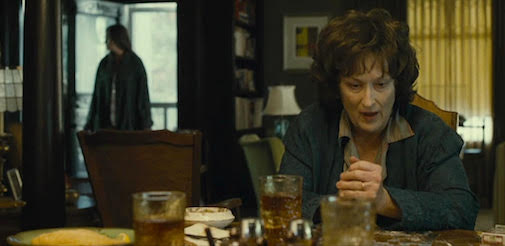
Letts’ drastically curtailed screenplay would have surely benefited from either a ballsier risk-taker or a more resourceful navigator of limited settings, but lucky for Letts, Wells, their collaborators, and those in the audience who prefer their performances nervy and their drama high, there is Streep. Intrepid and ingenious from the start, Streep announces her heightened intentions directly upon her arrival, letting loose with the first of a string of spittle-flecked, expletive-laden outbursts, in this case barking at Beverly, “Why don’t you go fuck a fucking sow’s ass?” in a voice thick with smoke and spite. There probably exists a more understated and deftly modulated take on this character in another actress’ arsenal; Spacek comes to mind, as do Blythe Danner, Cherry Jones, Alfre Woodard, and Joanne Woodward. But Streep’s relentless theatrics not only fit but enrich the outlandishly poisonous creation that is Violet Weston, fussily but always fascinatingly conveying the flawed, human dimensionality that other actors (like Juliette Lewis, as Violet’s flibbertigibbet youngest daughter Karen, and Margo Martindale, as Violet’s boorish sister Mattie Fae) keep insisting their characters possess.
Streep is working on a register unreachable by even the gamest and ablest of her scene partners, like Julia Roberts, who always plays a great prickly pear and whose hardened, foregrounded eldest daughter Barbara is maybe the true protagonist of this adaptation. Wells’ stagnancy of vision limits the variation of Roberts’ approach and curbs her willingness to take chances, but Streep continues to push and prod at the piece regardless of who’s behind the camera, courting our repulsion in a way that stays true to Violet. Streep goes big because she can and because a character who suddenly, shrilly, and inanely screams, “Where’s the meat?” at her own husband’s funeral dinner, for no other reason than because she can, merits the overstatement.
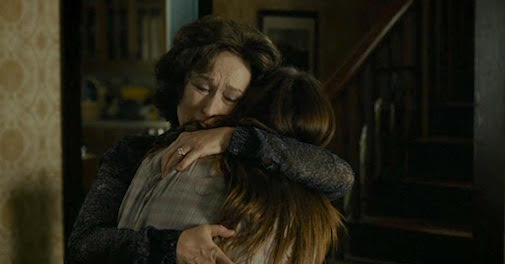
There’s a lot more in this performance to unpack, but what do you appreciate about Streep’s take-no-prisoners presentation?
JOHN: I’m glad you mentioned Ironweed; for me, Violet Weston is Streep’s grown-up variation of Helen Archer, swapping alcohol for pills and defined more by the weight of traumatic family history than the despondency of loneliness. Like Streep’s performance in Ironweed, her Violet is that unique melding of theatricality and interiority central to these types of characterizations. Violet clearly relishes her bouts of “truth-telling,” taking pleasure in any opportunity to relate the abuses of her childhood, spewing venom at her relatives in that thick Midwestern accent. But with Meryl, a monster is never really just a monster; there is equal parts pathos and villainy to Violet. Even in the centerpiece dinner scene, where Violet eats cigarettes as her insults cut as deep as an oil well, Streep suggests that Violet wants her children to bear her pain with her; her barbs are invitations to suffer the painful truths of disappointment and the inherited abuse that courses through their poisoned family tree. As dazed and incoherent as those pills make her, it’s even more terrifying to consider Violet as being considerably lucid and honest during her furious tangents. Streep forces the viewer to reckon with Violet’s pain, even when she’s inflicting it on others.
On the DVD’s making-of feature, Streep discusses what attracted her to Violet, aside from the obvious pedigree of the script and the juiciness of this coveted role. She speaks about how liberating it was to play a character so ferociously forthcoming, and that she felt immense freedom in airing the frustrations of a generation of women whose avenues were blocked, ambitions thwarted, and educations limited by the restrictive realities of being a homemaker. These unfulfilled women instead poured all their hopes and dreams into their children, only to inevitably find them a disappointment; their offspring’s relative adolescent comfort, poles apart from the impoverished childhoods of their parents, failed to ignite a drive for hard work and ambition. Streep’s performance illustrates one woman’s mission to detonate a hurt locker of pain at any cost; even if Violet can no longer distinguish frustration from outright resentment, Streep renders her emotional breakdown with supreme control and uncompromising honesty.
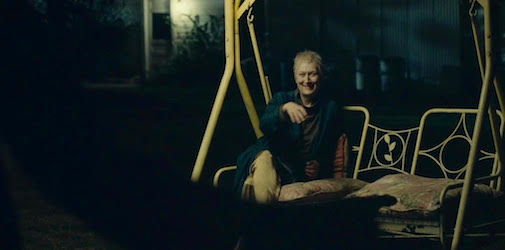
As big as Streep can go for most of the film, she knows exactly when to reign it in, change her delivery, and offer a necessary glimpse at Violet’s vulnerability. The entire performance comes together in a monologue that the character relates to her daughters on the porch. With her natural, balding blonde hair and her thin body pale as a glacier and wrapped in white, Streep calmly shatters the merciless portrait she had previously painted as Violet tells a devastating story about a pair of boots she wanted for Christmas as a young girl. Slipping completely into the memory, Streep’s happiness and girlish desire for these cowboy boots is immediately disarming; she transports the viewer back to those early memories while retaining the initial feelings of anticipation that her mother would buy her this cherished item. But we soon learn that her mother was a “nasty, mean old lady,” and instead purposely bought her daughter tattered, shit-covered shoes to dash her dreams come Christmas morning. What’s remarkable is the extent to which present-day Violet is actually able to deceive herself into thinking that those coveted boots might just be underneath the tree, only to have the truth of her memory devastate her — and us. This skillfully-played, pitch-perfect scene further complicates our sympathy for the character, but it also, in a sense, clarifies a great deal about her.
Streep’s wrenching monologue is a cherished outlier in what feels like an endless marathon of actors taking turns yelling, “What is wrong with you?” at each other. Supervisor John Wells fails to modulate the efforts of his talented actors to any notable effect, but Streep has at this point in her career learned how to more or less direct herself. Criticisms of her approach in August are sometimes valid — it’s not exactly a subtle performance, with some mannered, showy flourishes here and there — but most of these dismissals read like wholesale dismissals of melodrama and the kind of overly expressive acting that the genre requires. Let’s settle this: Is Meryl overacting here, or are disgruntled viewers unable to gauge the requirements and merits of her chosen method?
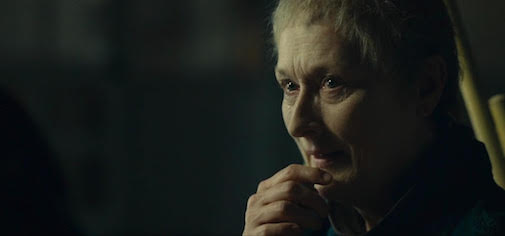
MATTHEW: Of course Meryl is overacting in August: Osage County, and bless her for doing so! Streep is the only consistent source of energy among this entire team of filmmakers, although the experienced editor Stephen Mirrione, a favorite of Steven Soderbergh, Alejandro González Iñárritu, and August producer George Clooney, sure does give her a run for her money, sloppily cutting together the whole thing like he was late for a meeting and refusing to let an eerie silence or painful pause linger. Unlike Wells, Mirrione, and countless others involved, Streep appears to have given every single gesture, exchange, and filleting zinger in Letts’ script its proper consideration and then found many a ways to amplify their significance through the physical and vocal transformations of her performance. In doing so, she makes us feel the emotional stakes of a story about a mother and daughter who have very little time for the feelings of others and bruise their nearest and dearest accordingly.
Through Streep, we see a Violet Weston who controls those around her like a wicked conductor, forcing them into playing all the expected parts in a warped familial symphony of her own making. Streep’s Violet tries to pass off her weaponized wit and destructive monstrosity as necessary survivalism when they’re really just products of her sick love of power; she is always scheming, always storing away information for later, devastating use, and always on the lookout for another body to push around, another spirit to wound. She fears the gaze of her family members drifting to someone else, depriving her of the attention that she ingests like a Venus flytrap, and will thus tell any tale and stack lie upon lie in order to secure it. The bold strokes of Streep’s performance are justified by the fundamental, oxygen-draining need of this character.
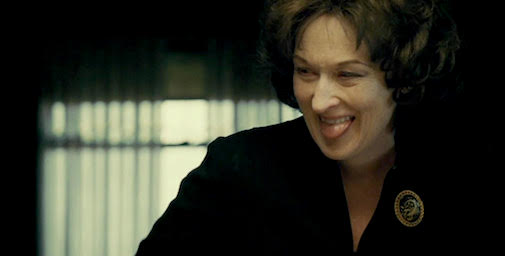
This is never more evident than in the centerpiece dinner scene, in which Streep is, as Chris Cooper’s Uncle Charlie declares it, “in rare form.” The actress makes a mesmerizing and often meaning-laden impression in her every frame, whether she’s glowering and slinging her arm over a chair with lethargic agitation as Charlie says a fumbling, impromptu grace or darting the two beady, almost jet-black pupils that sit in her sockets with comprehending concentration from middle daughter Ivy (Julianne Nicholson) to Little Charles (Benedict Cumberbatch), the first cousin much closer to her own brood than initially assumed. In one close-up, Streep’s eyes sparkle with malice when Barbara tattles on her daughter’s lapses in vegetarianism, recognizing and appreciating a fellow master manipulator who sees everything and forgets nothing, perhaps even relishing the fact that this particular one was brought into the world by her. In moments like these, Streep manages to authenticate Letts’ calculated thesis that the sins of the mother are reenacted by the daughter and implant it within what might have been nothing more major than a throwaway piece of multigenerational interaction.
Streep excels most in the moments where Wells isn’t effortfully trying to cinematize Letts’ play, but she occasionally pays the price for his dubious choices. When the family receives word of Beverly’s death, Wells turns up the volume on the Eric Clapton record that Violet has put on as she spirals out of control, drowning out and idiotically drawing our attention away from Streep’s groggy, inarticulate dumb show, which captures more of Violet’s delirious state of mind than any soundtrack cue ever could. Streep is also forced into selling a ridiculous scene in which Violet runs for her life through a field of hay rolls, which directly follows a visit to Violet’s enabling doctor, the two moments comprising a needless opening-out of this essentially domestic drama.
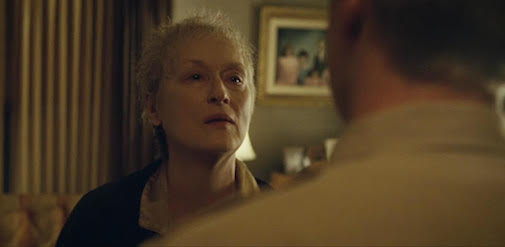
There are certain instances where I can understand why Streep’s characterization is just too much for some viewers, like when Violet gnaws on her curved pinky finger in the back of Barbara’s car or staggers around her house in a pill-induced stupor with the clumsiness of a tyke just finding her footing. But so much else in this interpretation suggests the riveting, unsentimental adaptation that might have been, one marked not only by entertaining intramural bickering but by the troubling poignancy that Streep summons up in her best moments. Violet’s monologue about her mother’s cruel Christmas prank is indeed as devastating and indelible as you mentioned. Streep grabs ahold of Letts’ words and comes alive with something like sensory remembrance, deepening the character by foregrounding her core contradiction as a woman of tough carapace and flinty demeanor who rebukes the pity she can’t stop inviting.
Like the greatest and purest of screen actresses, Streep doesn’t require pages of evocative speech to achieve this effect. The tragedy of Violet Weston is evident early on, staring back at her as Streep cocks a girlish pose and juts out an angular arm while staring at herself in the mirror, draping a slinky dress over her shrunken frame. Maybe she’s remembering the knockout beauty she was in a past life or just seeing past the haggard, withered skeleton that disease, spite, and the passage of time have made of her. Either way, she has our attention.
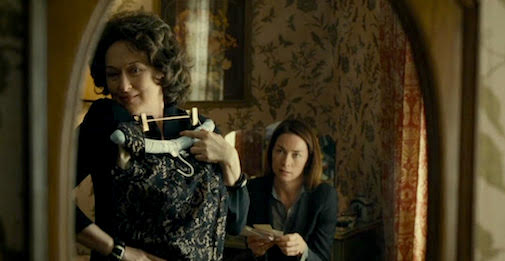



Reader Comments (78)
Violet Weston is such a great part that no matter who played it we would be dreaming of other actress's interpretations of it (for me, it's mostly Jessica Lange and Cherry Jones), but it's difficult to not be disappointed by the film no matter what one thinks of Streep's performance in it. If only Mike Nichols hadn't passed - he would have been the ideal choice to direct, but I would have also liked it if William Friedkin had continued his collaboration with Tracy Letts after Bug and Killer Joe.
As for Streep... it's not one of my favorite performances. I don't mind her going big (the part calls for it), but I do mind that you can SEE her acting. There's a way to go over the top without constantly calling attention to one's own performing of the scene at hand (consider Streep's own performance in Julie & Julia), but she doesn't do that here. Still, the performance has its pleasures, namely every single time she has a showdown with Julia Roberts.
Dan--great post. You definitely can see Meryl's acting. I think Julia steals the movie.
The best thing about this movie can be summed up in two words: Julianne Nicholson. Everything else, Meryl and Julia included, is merely window dressing.
No one is saying that Meryl should not be overacting here, yes the role requires a BIG performance, BUT the thing with Meryl is that when she goes over the top you can notice she’s acting, it looks like the performance is too demanding for her, she’s a better match with subtle performances that can grow bigger, a role where she can prove all her rank, and not to be lousy and crazy the whole time... That’s a role that Glenn should have played because Glenn is known for being great with over the top performances like Fattal attraction or 101 Dalamtians, and there’s the difference between Meryl and Glenn, Meryl can’t be over the top all the time because she can be really bad ( Mamma Mia ) and Glenn can’t be quiet all the time (Albert Nobbs) ... this Role is the prove that Meryl ( who I love ) has a monopoly around characters for woman over 50, Meryl is a great actress but she should leave some roles for other legends like Glenn, Jessica, Sally Field, Goldie, etc ... that’s all
Jessica Lange keeps coming up in several comments. Let me tell you that she would have been much more over-the-top than Meryl. I love the both, but they have many mannerisms and tics. Just as Bette Davis or Geraldine Page. The other actresses mentioned here would probably be more "subtle".
Just a reminder: Streep was a semi finalist in your ballot that year, Nathaniel...
Are people bashing Meryl because of the performance or because she is not a fan of donald trump?
LOL at people suggesting their faves (who were not even considered) would have done better. As if. Streep is iconic. Glenn Close? Pfft. There can be a 100 people in the room, but it only takes one to believe in you.
That's the truly shitty part--they weren't even considered. Terrible.
As I've mentioned, if you have watched the play which I did (with both Dunagan and Parsons), you will have realized that there's zero nuance in their performances. They were hauling themselves up and down the stage and screaming and spitting fire throughout the three hours or so. That was it. Great performances no doubt but all BIG and no subtlety. And with most over the top performances I can see them ACTING right away. I don't think there's anything wrong per se. If both these actresses were to play the role on screen, I bet it will be hewed closely to their stage performances. The vitriol towards Meryl is to me, rather unwarranted. It's okay to not like her performance but to say other actresses would have done better is highly questionable, with due respect to the likes of Lange and Close, etc.
Jans, I love your posts and respect your opinion. We differ, but I appreciate your thoughtfulness in your opinions.
It's fascinating that people so identify with total strangers! Jessica is a TV star. She cannot carry a film. Even with Streep and Roberts (two of the most bankable movie stars in the modern era, and I mean the past 50 years), this movie barely broke even. No one would have made a film of this. It barely got made with a $25M budget. I have to give Tracy Letts credit because no one would be so passionate about his play and this film unless people were somehow moved to go ... slightly insane, emotional and adamant? Maybe it's a classic and we don't know it yet. X Violet
JF--I call bullshit on everything you just posted.
@brookeboy. You hate Streep OK. but you think you know it all!!! You come off that way in all your posts. So I seldom read your responses lately.
I thought Meryl's Violet was wonderful; repugnant yes, but moving too. Whereas Julia Roberts' character, her daughter I found unkind and lacking in compassion - her "redemptive" last scene ruined the film. Other than that I laughed long and hard at the humour of a family get-together gone wrong.
You understood the play. @bede NZ
in what fictional universe did that one person conjure the idea that julia roberts made that request for the ending? jesus. delusional people.
i think this film was badly directed and well acted by everyone.
You know who could have pulled off this character like a master? Isabelle Huppert. She's the most abrasive actress of all time without having to scream her lines like there's no tomorrow. Too bad she's French.
Oh my, who wld've thot this is Meryl's most polarizing film! I thot pple really dislike her win for The Iron Lady, but compare to the hatred towards her nom for AOC. Her win 2 yrs ago pales in comparison.
I suspect if she was not nom, more pple will b kinder to her perf here.
But its mostly true, Meryl is at her most OTT, repugnant, scenery chewing in AOC. Does Emma deserves the nom more? Definitely. I had thot Emma was the biggest threat to Queen Cate tt yr. But how wrong i was. Her snub is really one o the worst in Oscar history.
Back to AOC. Yes, Meryl was OTT, Julia was betta, but the best in show as so many hav rightfully pointed out is the subtle heartbreaking turn by Nicholson. Among all the plate smashing n yelling histrionics, her quiet subtle perf is the one tt gets me 😢
It's a shame tt she wasn't even consider for award recognition. I blame it on the big movie star Miss Pretty Woman, who IS a co-lead o the film fr taking up the spot tt shld've gone to Nicholson.
Oh I'm going to have to change my name... there's another Jb.
For the record, I on'y saw this once, on a plane, but I remember actually loving Meryl's unsubtle & OTT performance.
Agree Emma T should have been nommed instead though.
My thought is that this role gets the most vitriol from some is because Streep has just won her third Oscar and many were hoping she would just go away. This nomination proved that despite wining a third that the Oscars were still in love.
I love the movie. Julianne Nicholson is the true revelation tho
rdf--I never read yours either.
Oh... gotta love the lunatic conspirators. Streep's speech was the night before the nominations deadline closed, I doubt it had an impact AND she gave it mainly to express why she had turned down the role wich was offered to her first (to my understanding she suggested Emma for the role) so... stop reaching.
Obviously you do??!!
This is my favorite post of the year! The Helen Sharp Center for the Criminally Insane.This is a camp horror comedy family classic. I would put it on a double bill with The Shining. Don't forget Julia also demanded to be campaigned as lead but had to submit to the Queen. Julia Meddler Roberts.
Well I read that one because my name was on it. Otherwise I skip your silly posts.
SRB - if I recall correctly, since George Clooney was a producer, he just gave the job to Wells, his old friend who directed him in "ER." So basically the good ol' boys club doing it's normal thing, handing opportunities to buddies instead of casting about for someone who actually deserves it.
Austin - that's a good point, but it's also a huge cast, the set definitely creates some challenges and I think a lot of people would be uncomfortable with the race relations now in a way that wasn't quite as obvious even 10 years ago (I mean, people were talking about that 10 years ago, too, but not as much as now). so I think it has a lot of things working against it when it comes to producing it for the stage.